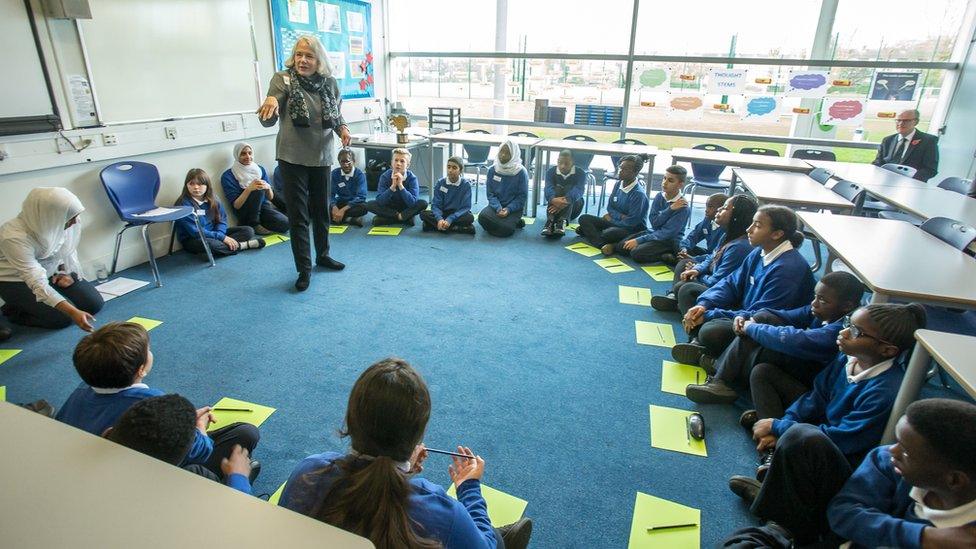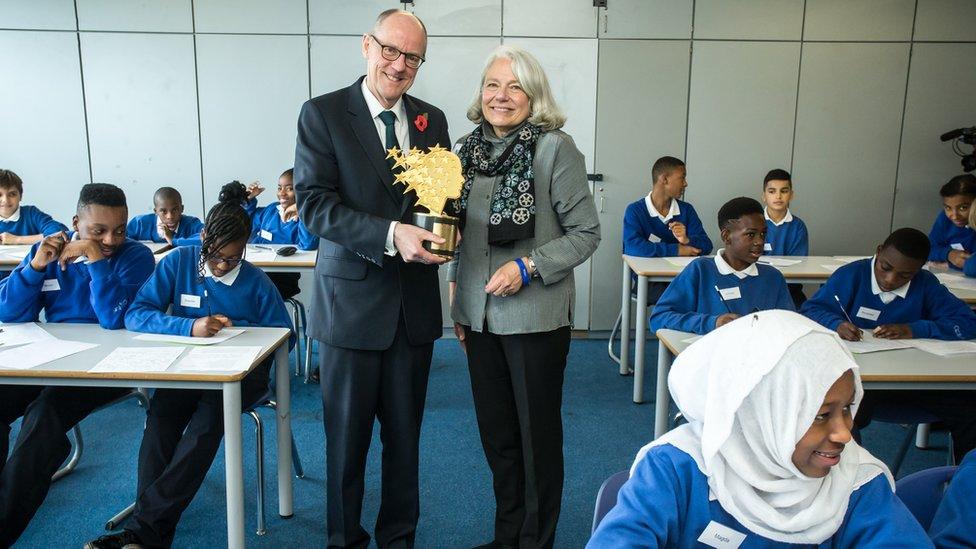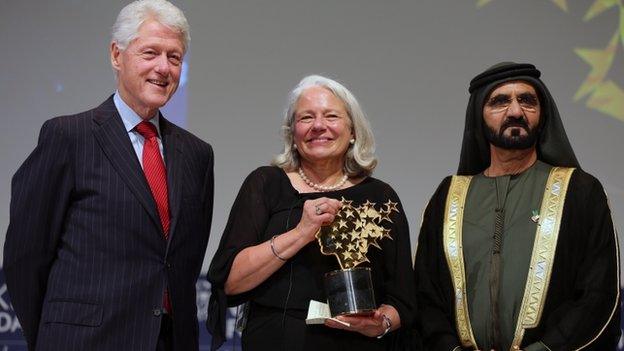'World's best teacher' warns on too much testing
- Published
Nancie Atwell says shouting is not the way to get pupils' attention
The "world's best teacher" says that a culture of excessive testing can damage standards and "decimate morale" among teachers.
Nancie Atwell, a US teacher who won the Global Teacher Prize earlier this year, was visiting a school in London.
She also said that teachers could get more attention from pupils from talking quietly than shouting.
Ms Atwell won a million-dollar prize - but immediately gave the money to her school in Maine.
On her visit to Capital City Academy in Willesden, north-west London, she said part of the prize had been spent on fixing the school boilers.
Ms Atwell was demonstrating her award-winning teaching skills in an English lesson to a class of 12 and 13-year-olds, with Schools Minister Nick Gibb watching.

The award-winning teacher says she likes pupils to use her first name
Softly spoken and fastidiously polite to the pupils, sitting in a circle around her, she taught a lesson about two poems. She also told them that her own pupils called her by her first name.
"I've been teaching a long time and something I've learnt is, almost the softer you are, the more attentive they are."
If there were behaviour problems, she said: "I would go to that student and say, 'What's the problem. You need to engage with this, stop talking.' I'm strict. I've also got what they call 'the look'... they fear it.
"The answer to almost every issue in the classroom is to talk to the kids about what's going on."
In terms of what made a great teacher, she said: "It's not my personality, it's not my intuition, it's what I know about professional methods."
'Life-changing'
She emphasised the importance of applying the lessons of research about what worked in the classroom.
Ms Atwell was awarded her prize at the Global Education and Skills Forum in Dubai, with former US President Bill Clinton on stage.
But she said that as a teacher "committed to public service", she would donate the prize to her school.

Schools Minister Nick Gibb, with Nancie Atwell and her prize, sat in on the lesson in Willesden
Speaking in London about her donation, she said: "I have everything I need. My car runs, my mortgage is paid, but my school and my students didn't have what they needed."
Ms Atwell said the prize, funded by the Varkey Foundation, was an important recognition of the "life-changing" potential of teaching.
But she warned against education systems moving to what she thought was an over-prescriptive curriculum.
Such an approach would limit children's range of reading, she warned, so that they would spend too long focusing on a small number of texts in order to pass tests.
"Parents are recognising that their children are being tested rather than taught," she said of US schools.
Autonomy
She criticised the move in the United States towards a "common core" curriculum, which she said "inhibits teachers' creativity".
For teachers, she said an excessive focus on testing and a curriculum based on passing a test was "de-professionalising" teaching.
"It's done nothing but decimate morale," she said.
"It takes away teachers' autonomy, their ability to respond to who their students are and what they see is going on in their classroom."
But she emphasised how much could be achieved by teachers when they were able to engage with students and develop their creativity and writing skills.
Mr Gibb, observing from the back of the class, said he supported Ms Atwell "in her drive to highlight the importance of literacy and to help spread the love of reading around the world".
"Every child, no matter what their background, should read widely and read well, giving them the best opportunity to get on in life."
And pupils in the class gave their own views on what made a great teacher - with a number of them saying they liked it when teachers were strict enough to let people learn.
One, Keara, said she liked it when lessons were quiet and everyone could concentrate.
"There's a time for laughing and a time for getting on with the work," she said.
- Published15 March 2015
